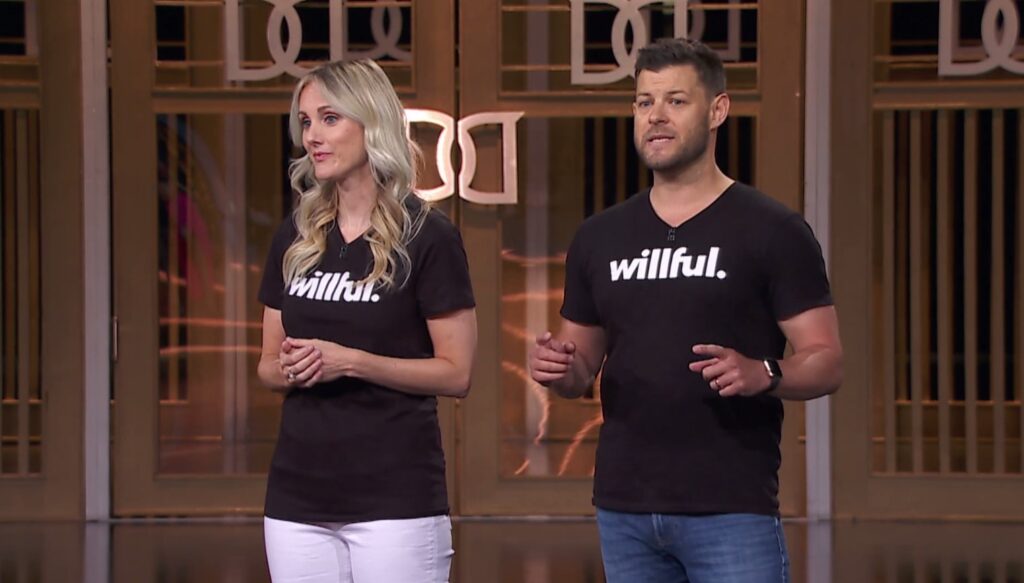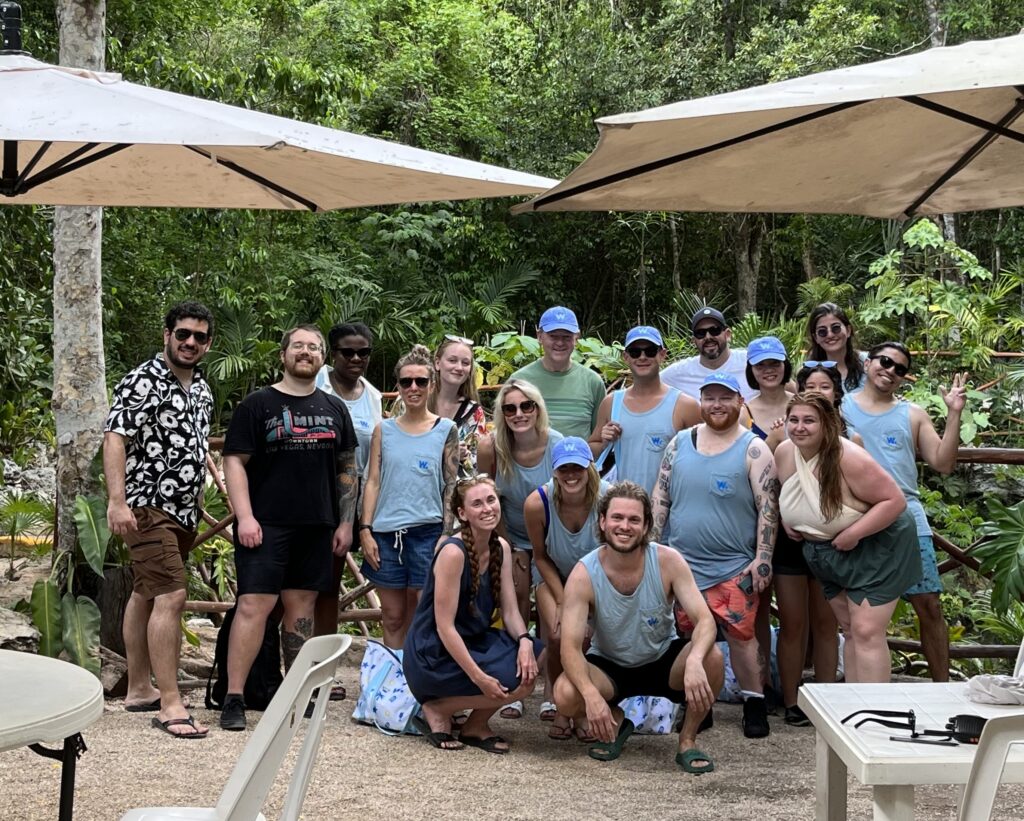Genesis of an idea
If you wanted to think of starting a company as a formula, you might find the most promising ones all have a phenomenal idea, an enterprising spirit, and a deep understanding of problem-solving for customers in common. These components set the foundation for a strong product or service, and just as importantly, a strong brand – something that was top-of-mind for Erin Bury when her husband came to her with the idea for Willful – an online legal will and estate planning platform.
Building a brand
Erin’s husband, Kevin Oulds, whom she describes as a “born entrepreneur”, had the original idea to start Willful after a family member passed away without discussing their end-of-life wishes. This type of experience often makes a person consider their own mortality and affairs. So, when this husband-and-wife team realized the cost and time barrier to getting a will drafted at a traditional law office, they saw the opportunity to build an alternative for an underserved market.
Erin reflects, “I didn’t grow up in an entrepreneurial family, and never aspired to start a company. But after taking a job at a startup early in my career, and then as the founding editor of BetaKit, where I spent my days interviewing entrepreneurs around the world, I fell in love with entrepreneurship and the idea that you could encounter a problem in your own life and solve it through starting a company”. Just like similar industry disruptors such as Wealthsimple and TurboTax, Willful leverages technology to make a complex topic simple to understand, cost efficient, and easy to use with an aesthetic and intuitive user experience. These elements make the service of estate planning accessible to key younger demographics, such as millennials. Erin believes that her deep understanding of this, backed by years of experience building brands from the ground-up and owning a PR agency has played a vital role in helping Willful scale as a B2C company that needs to reach millions of Canadians. Since launching in 2017, Willful has created over 300,000 documents for tens of thousands of customers in all 10 provinces, including a fully bilingual platform in Quebec, and has hundreds of 5-star reviews on TrustPilot and Google, as well as an A+ Better Business Bureau rating.
Navigating industry dynamics
Now, your first instinct might be to assume that estate lawyers are not too happy about a venture such as Willful popping up in their space and disrupting what is largely still a traditional industry. However, Erin insists they see their platform as complementary to lawyers. “After all, the folks spending $99 on a will with us are certainly not the same folks spending $1,000+ with a lawyer, and there’s room for both of us”, she states. Think of it this way, for many people, creating a will shouldn’t be overly complex and involve few steps such as appointing beneficiaries and executors. This is who Willful appeals to, and the key value proposition of the online tool they’ve created is reducing cost and complexity. However, some people’s affairs are more complicated, and these cases should be handled by a legal expert.
Yet, there are still barriers to introducing technology to the world of estate planning; legal wills still have to be signed traditionally with ink and stored as a physical copy in all Canadian provinces except British Columbia. A true market leader, Willful is doing far more than digitizing a traditional industry, they are adapting to rapidly changing customer preferences and getting there first:

OnebigstepforwardwaswhenBCallowedelectronicsignatures,virtualwitnessing,anddigitalstorageofwillsin2021.WillfulexecutedthefirstdigitalwillinBChistoryinpartnershipwithDocuSign,andwe’vesincehelpedtodigitallyexecuteover1,000willsforourBCcustomers.WetrulybelievethatdigitalwillswillincreasethenumberofexecutedwillsinCanada,whichisourultimatemissionatWillful.
Commitment to education
Although Willful is not the only online provider within this space, they take pride in the fact that their platform emphasizes education on estate planning. In fact, they were the first online will provider accepted to the Law Society of Ontario’s Access to Innovation program. It’s this kind of forward thinking that has enabled Willful to scale both rapidly and successfully. Erin explains that her team has adopted the Entrepreneur Operating System (EOS), which helps them set their quarterly goals as well as one-year, three-year and ten-year visions. Essentially, it’s a way to keep track of consumer behavior, legislative changes, and any other external factors that could present as either threats or opportunities for growth. One of those opportunities for growth on Willful’s radar currently is artificial intelligence (AI), something that has the potential to significantly change how legal services are provided.
Scaling strategies
Erin notes that the transactional nature of their business can be challenging at times with the expectation of always needing recurring revenue but emphasizes that this transactional nature is also what has enabled them to grow so fast. While a Canadian would typically pay more than $800 for a will and power of attorney documents and must pay a steep hourly rate whenever a life change would trigger updates to these documents, Willful keeps it simple: pricing starts at $99 for a will, and updates can be made at any time with no additional fees. The accessibility of their platform unlocks the volume needed to scale successfully. It’s also not a market that gets saturated easily; there will always be new generations of people who will require estate planning services, and the team at Willful plans on adding new products to their portfolio in the future. They have also secured partnerships with large financial institutions and insurance companies, including Allstate Insurance, CIBC, Meridian Credit Union, Arbor Memorial funeral homes, and a recent collaboration with Wealthsimple. This has helped significantly broaden their reach, by leveraging much larger audience pools. It’s a win-win for both parties; financial, insurance, and legal services are very complementary and are often sought at the same time, around major life milestones.
Financial growth and resilience
It’s this kind of forward thinking and robust business planning that has earned Willful a spot on Glory Professional’s (formerly Bay St. Bull’s) Power 50 companies for several years in a row. The company has also had major success in raising funds over the past few years. Raising over $4M from greatly diverse sources, including friends and family, ex-Shopify angel investors, and venture capitalists – their main VC being Tactico – Erin shares that her tenure at Willful has been a masterclass in fundraising. Her journey includes many highs – from successfully raising several rounds of funding including hundreds of thousands in non-dilutive capital to getting Michele Romanow on board as an investor after pitching on Dragons’ Den in 2021 – but it also includes the lows. Receiving countless “no’s” is the less glamorous but blunt reality that all entrepreneurs and startups face in their journey to raise funds. Erin’s key takeaway from this? “The best position to be in is raising because you want to accelerate growth, not because you absolutely must raise to make payroll. Funding through revenue is the best autonomy you can have as a startup.”
Cultural leadership
For any entrepreneur, founder, or CEO, these types of financial wins are extremely validating, and are often seen from the outside as being the most important. That being said, Erin measures success on many levels. Having been honoured as one of DMZ’s Women of the Year and one of The Peak’s Emerging Leaders, she still wants to highlight the perhaps less flashy achievements. “One of my proudest ones is building a fully remote company with a positive, inclusive culture – we have employees in 6 provinces, and we’ve been a leader with policies like the ability to work from anywhere, expanded bereavement leave, flexible working hours, and a culture of accountability where we care more about output than time spent.” This is no easy or common feat – one that is certainly not emphasized or celebrated enough in startup culture, where “hustle culture” is heard far too often. Erin says she feels fortunate to have always worked in settings dominated by women, and to have worked alongside many inspiring women founders and leaders in tech.

She doesn’t feel disadvantaged by being an influential woman in business and tech – quite the opposite – it’s helped her build extremely strong teams. Perhaps that’s the part of the equation of building a successful venture which many people still miss – just look at how far Erin has taken Willful, and this is just the beginning.
To learn more about Willful, visit their website here.




